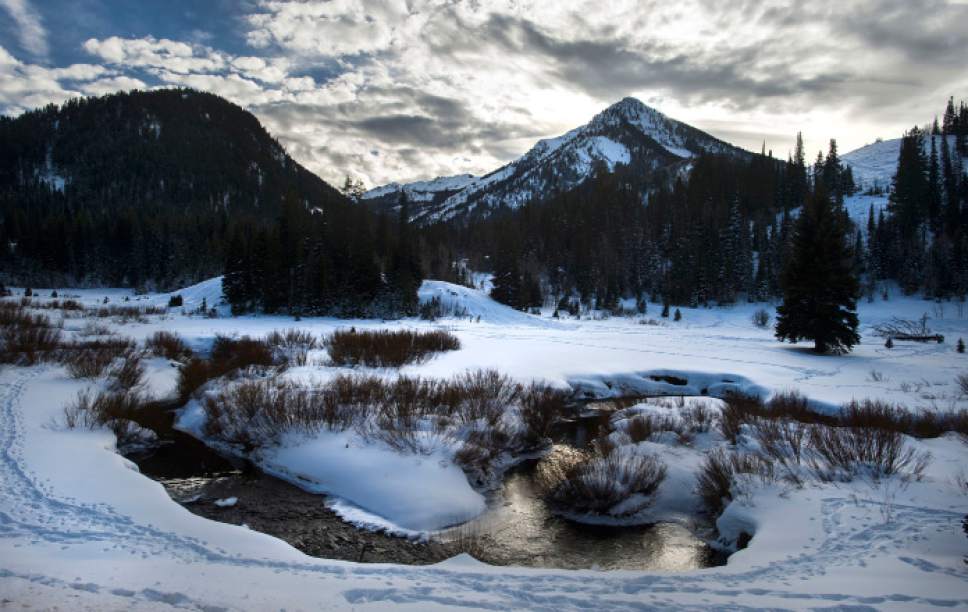This is an archived article that was published on sltrib.com in 2017, and information in the article may be outdated. It is provided only for personal research purposes and may not be reprinted.
Turns out, water isn't the only thing that flows downhill out of the Cottonwood canyons.
For years, a group of landowners in Big Cottonwood Canyon have been locked in battles with Salt Lake City over land ownership and access to water, first in the courts, and now, it appears, in the state Capitol.
The property owners have enlisted the help of the head of a state commission created to conserve lands that now is considering whether to roll back a law on the books for more than a century that lets cities that get their water from the canyon protect the public water supply from contamination.
It's why you can't have dogs in the Cottonwood canyons, and it's also why you don't see cabins sprinkled along the mountainside. And, if a group of canyon landowners get their way, it may be wiped away.
On Thursday, the issue will be teed up before the little-known Quality Growth Commission. The commission has, over the years, administered state funds to conserve tens of thousands of acres of land. But as the money dried up, commission Director John Bennett turned his focus to policy issues.
Among the first was a request last May from Big Cottonwood landowner Wayne Crawford to look at the state law allowing Salt Lake City to regulate the canyon watershed outside city boundaries.
Bennett was already familiar with Crawford and the canyon disputes by then because Bennett simultaneously served as president of the Wasatch Canyons Foundation, a nonprofit arm that has worked closely with the canyon landowners.
For example, among thousands of pages of material obtained by the conservation group Save Our Canyons are emails that show Bennett — using his state email account — strategized with property owners to try to defeat legislation authorizing a mountain planning district that they opposed.
For their part, landowners in Big Cottonwood Canyon who have been driving to strip Salt Lake City and others of their "extraterritorial jurisdiction" say their aim is to conserve the canyons and they portray themselves as the little guy standing up to government run amok.
But if conservation is the aim, and not profit, some parts of the narrative don't add up.
Take, for example, what Crawford and friends tried to pull with an old mining claim, known as the Argenta property.
The land had been owned by a old company called Colonia Mining, but was basically abandoned. So Crawford & Co. created a company called Colonia Mining II, tried to claim it through a process called adverse possession — essentially squatting on the land, making some improvements and paying back taxes — and taking ownership. Crawford then listed the property for $1.5 million.
Sound confusing? Maybe even misleading?
Salt Lake City thought so and asked prosecutors to investigate whether it was fraud. They declined to press charges, but it was enough of a threat that, according to emails, there was talk of asking Gov. Gary Herbert to issue a pardon to Crawford, a route described as their "ace in the hole." (It wasn't actually an ace, because the governor can't issue pardons.)
Instead, the city sued on behalf of the original owners to defend ownership of the property.
At one point, emails show Bennett, again using his state account, sought input from the attorney general's office on the Colonia lawsuit and shared it with Crawford's representative. The litigation was intense — then Salt Lake City Mayor Ralph Becker called Crawford and his partners "terrorists," and Crawford threatened to sue Becker for defamation. In the end, the lawsuit was settled and the city bought the land for conservation purposes from the original owners for about $200,000.
The city fought a similar fight further up the canyon when a landowner named Kevin Tolton, under the name Great Western Mining Company, tried to claim ownership of 60-plus acres that includes Lake Catherine and Lake Mary.
Thing is, Salt Lake City had a deed to the property and again won in court.
So is what we're seeing in the Cottonwood canyons a case of a local government beating down well-meaning conservationists? Or a group of malcontents looking to cash in? Or maybe some of both?
There have been proposals for various developments in the Cardiff Fork area of Big Cottonwood and farther up the canyon near Solitude Ski Resort. In 2010, Salt Lake County planners were presented with a proposal to build cabins, allow animals and potentially build a ski lift in Cardiff, but the plan never got off the ground.
Documents prepared for the Cardiff Canyon Owners Association in 2011 by their consultant, Dave Robinson, envisioned consolidating development and building 20 cabins in the area or swapping it out for developable land west of the Capitol. Needless to say, the cabins would be worth millions — if the city would permit them and provide the water, which it won't do.
Robinson's frustration with the city and Salt Lake County over the property disputes are largely what drove him to run for mayor against Becker in 2015 and against Salt Lake County Mayor Ben McAdams last year.
Robinson is now president of the Wasatch Canyons Foundation after Bennett stepped down last September amid questions of his conflicts of interest (it is worth noting there is no indication Bennett benefited financially through his work with the foundation).
All this brings us back to the Quality Growth Commission.
The debate over the watershed management had been put on hold amid opposition from Salt Lake City, Salt Lake County, Sandy City and the Salt Lake County Council of Governments. But, with pressure from Republican lawmakers, Bennett last month re-started the process, leading to the hearing Thursday.
Laura Briefer, Salt Lake City's public utilities director, has said in an email to the commission that, because of misinformation that Bennett has spread and the sense that the city's position is not being fairly heard, she will not testify before the commission.
The angry landowners certainly will. And chances are good the commission, made up of rural members and led by Bennett, who has shown his cards through his collusion with the property owners, will recommend stripping or greatly shrinking Salt Lake City's watershed jurisdiction.
From there, it will go to the Legislature, where the future of the preservation of the canyon watershed could be in the balance.







